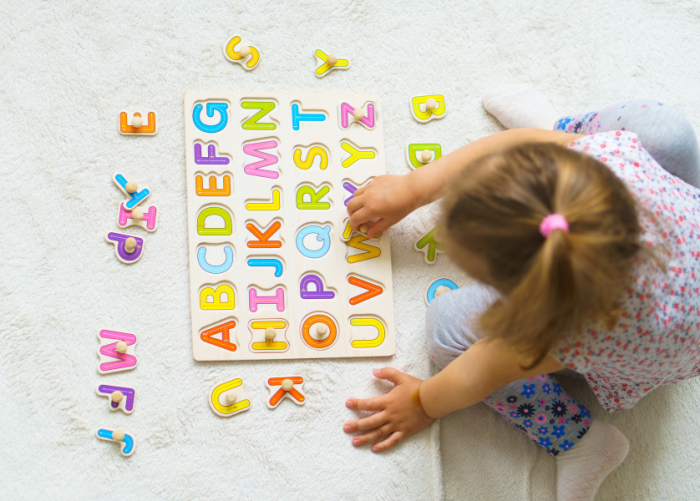A child grows up very fast. In the blink of an eye, that baby you were swaddling in your arms is now ready to go to playschool and kindergarten. And before you know it, he is ready to take on formal education and enter Standard One.
Actually, learning for a child begins long before he goes to school. A child begins learning the moment he is born[1]. Apart from the times he is sleeping, he is observing, listening, watching, touching, mimicking, absorbing, discovering and basically figuring things out about how the world works during all of his waking moments.
Notice how he tries to communicate with you by cooing and babbling or even by crying when he wants to tell you something. The brain is immatured and not fully developed when he is born but from his earliest days, every time he experiences anything around him ─ whether it’s interacting with you or the family, picking up sounds he hears or things he sees or even trying out new-found strengths or dexterity such as turning over in his cot, sitting up, crawling or pointing, the brain’s neurons (nerve cells) are making synapses or connections and growing and developing simultaneously.
Learning Begins at Birth

Synapses are crucial to the learning process of the child as they are the building blocks of memory[2]. Without memory, we do not learn. Therefore learning begins at birth and as these synapses multiply at a speed unmatched for the rest of his life, they shape not just the child’s academic, social and cognitive skills but his outlook for his future as well.
As explained in an earlier article, 80% of the child’s brain is formed in the first three years of life. By the time he reaches the age of five, his brain would have made the majority of its synapses and grown to 90% of its full adult size. Therefore the best time to maximise his learning potential is in the first five years of his life.
How to Enhance Your Child’s Learning Skills

Parents are a great influence on a child’s learning ability. They build experiences and so many teachable moments for the child such as helping them master social, motor and communication skills like speaking, counting, picking up new vocabulary and reasoning, learning manners, morals, sitting, standing, walking, putting on their own shoes and knowing which one goes left and which one goes right, putting on their own clothes, and so on. The parent’s role is in guiding the child towards his own independence so that someday in the future, he grows up to be a successful adult.
While intelligence and getting good grades is not everything there is to life, parents can even raise their child’s IQ and performance in school by doing the following.
1: Provide a Positive and Nurturing Environment in the Home
Create a home that is supportive of his growing up journey and learning needs. Allow him to express his feelings or share his moments, listen to each other’s points of view, spend quality time together and build trust and respect for each other. Teach by example. Discipline when necessary but do so with love.
In the home environment, provide a space for him that is conducive to study, read, draw or do his homework. The area should not be disruptive and noisy or be filled with distractions such as the TV or game consoles or even pets which could divert his attention.
2: Provide the Right Nutrition to Boost Mental Power

Believe it or not, diet and the nutrition it provides play a big role in the physical and mental development of a growing child. Many studies have found that Omega 3 Fatty Acids such as docosahexaenoic acid (DHA), alpha-linolenic acid (ALA) and eicosapentaenoic acid (EPA) have proven beneficial for brain function, mental stability and mood in children, particularly in areas of focus, concentration, memory, absorption of information and all round brain development.
As the brain is made up of 60% fat[3] and 40% water, protein, carbohydrates and salt, these essential fatty acids supply the brain with the crucial food it needs to grow tissues and support synapses and myelination (the wrapping of the neuron’s axons or “transmission cable” in fatty cells).
Fish, in particular, especially oily fish such as Wild Salmon, Mackerel, Fresh Tuna, Trout, Sardines and Herring, are rich in these essential fatty acids. Not only that, fish is also a great source of protein ─ another crucial component needed for brain building.
Children’s brains need proteins[4] to build new neural connections. When the child consumes protein, the body breaks it down into amino acids and these are needed to create new neural pathways. As the child is growing at exponential speeds during his early years, they need extra protein to build these connections in their brain. Protein can be found in meat, poultry, seafood, beans, peas, eggs, soy products, nuts, seeds as well as dairy.
Of course, other nutrients derived from other foods are needed too, to work in tandem to help children boost mental performance. Foods that are rich in a range of minerals and vitamins include fruits, colourful vegetables such as tomatoes, sweet potatoes, pumpkin, carrots, dark leafy greens like spinach and lettuces, and cruciferous vegetables such as broccoli, cauliflower and cabbages.
Apart from that, the child requires complex carbohydrates such as whole grain found in brown rice, oats, wheat germ, barley to provide glucose ─ the fuel needed to energise the brain and enhance cognitive skills.
But there is one problem. And that is ─ to get the child to eat all of these foods, and in sufficiency quantities to meet his daily nutrient demands. During his toddler years when he is just beginning to try out new textures and flavours and develop his own likes and dislikes, he is unlikely to eat all of these foods.
Fortunately, there is Morinaga Chil-kid to supplement your child’s diet if he is not eating enough fish or the vast array of foods he’s supposed to eat to provide the nutrients needed during his growing stage.

Apart from providing the wholesome goodness of dairy, Morinaga Chil-kid, specially formulated for children aged 1 to 7, is fortified with Omega 3& 6 long chain polyunsaturated fatty acids (LCPs) including Docosahexaenoic acid (DHA) and arachidonic acid ARA. A number of studies[5] have conclusive proof that these LCPs are crucial for brain function[6] as well as visual and cognitive development in growing children. Furthermore, children who consume LCPs from early in life have proven to have higher IQs than their counterparts who have not.
The growing-up formula also has galacto-oligosaccharides (GOS) and five types of Nucleotides. We have seen in an earlier article how the brain, gastro-intestinal health as well as the immune system are all inter-related and have a synergistic relationship where one boosts the performance of the other.
Additionally, it also contains nutrients such as Vitamin D, Vitamin B6, Vitamin E, Vitamin C, Taurine, Calcium, Iron, Zinc, Selenium and others. All in all, one to three cups of Morinaga Chil-kid makes up for all the brain-enhancing nutrients a child’s diet may lack in a day.
3: Talk and Read to Them

Talk and interact with your child more often. Most parents have busy careers and busy lifestyles but make time to spend time with your children. Have two-way conversations and encourage them to express themselves and ask you questions. This way, you and he will bond better. Your child will know that he will always have a listening ear for him and you will learn more about your child’s emerging personality, interests and skills.
“The more conversations you have with your child, the more intelligent he will be,” wrote behavioural psychologist Bryan Roche, in the Psychology Today website[7]. You can incorporate play in your conversations and interactions and turn them into teaching games of counting and vocabulary. According to the behavioural psychologist, you can raise your child’s IQ by six points just by talking to him throughout his early years.
Reading to the child is also very beneficial. “Kids whose parents read to them most days have higher IQs,” writes Roche. It introduces them to words and a wider vocabulary and stimulates their imagination. This is particularly true if you make story telling time an interactive occasion where you incorporate different voices, expressions and emotions. This way the child associates with the meaning of the words and the feelings they convey. You can also ask questions to activate his critical thinking skills, like: “What do you think he will do?” or “What do you think will happen next?”
4: Learn Music

Everybody knows, music is a mood changer. It evokes emotions, promotes creativity, exercises the brain and muscle coordination and it’s fun. In children who take up a musical instrument, it hones their abilities in areas such as spatial-temporal intelligence useful for complex problem solving such as in mathematics and chess while it also teaches discipline and focus. School children who learn music and play a musical instrument have been found to have improved grades. They also spell better, and have better hearing and memory, emotional perception, alertness, attentiveness as well as planning skills. Research shows that playing a musical instrument positively influences IQ and raises it by an average of seven points[8].
5: Expect Your Children to be Smart
When a parent expects their child to be smart, and conveys that message with full conviction, the child will be smarter says a groundbreaking study titled “Believing You Can Get Smarter Makes You Smarter[9]”. Psychologists pointed out that students who were told this message and who believed in it, performed better academically. Not only that, they took their studies more seriously than others too.
Parents who want their children to be smarter should tell their children they are smart and expect them to be smart. It’s a way of instilling confidence in the child and when that child is convinced that he is indeed smart and getting smarter by the day, it will fire up his enthusiasm to learn new things, eventually making him really smarter.






